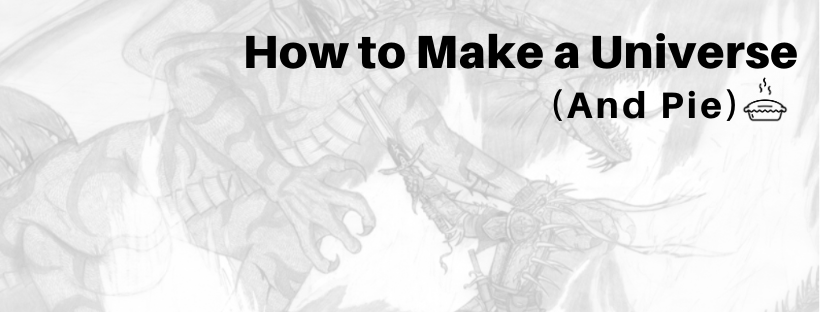If you want to make a fun game, first you must invent a universe.
So we're moving from Einstein to Carl Sagan. I'm on a bit of a science kick right now. Next time I'll quote Marie Curie or Grace Hopper. Sagan's original quote was about apple pie, and how to make an apple pie you first needed a universe that could support the existence of apple pies. It's true of games too, but with an extra meta level to make it more fun. There's the deepest level, where you need a universe that can support the existence of the game designer to make the game, same as for the apple pie, but RPGs can build on that idea as we need a fictional universe created by the designer in which the game exists.
Regardless of genre or setting, all RPGs live in their own meta universes complete with their own set of physical laws (the rules), locations (the setting), and histories (the backstory). The game emerges from these first principles and creates the living, breathing world for characters to inhabit.
But does it, really? Do designers start with first principles and then work out? Or do they come up with a cool idea and work backwards filling in just enough for the game not to collapse under its own weight, and then hope players won't look too deep under the hood?
I've done both.
Edge, my first game started out with a core set of first principles:
-Warriors need to be awesome
-Gameplay should resolve quick
-No murder-hobos
From there I built a basic setting and borrowed a ruleset. Dissatisfied with my creation, I started again. I built my own ruleset and rebuilt the setting to better support it. I spent years toiling away at it. The result was a sprawling series of now defunct webpages. I wrote over a quarter of a million words on setting, backstory, history, politics, and minutia. I dug down and detailed every major city and town, leaving hundreds of mini-adventure hooks in my wake. I created a world that, to me, felt alive and ready to be lived in.
It was too much. Way too much. There was so much detail it was hard to find the relevant parts. My expansive prose rambled off into dead-ends that no one would ever use, and I strayed so far from my core ideas that the game became a bloated mess.
It took an editor (my wife, Cait) to save me. She cut my 250 000+ words down to 160 000. She excised massive sections of self-indulgent dreck, and cut out redundant and non-functional parts of the game. I lamented the loss of my opus, but in the end I came to appreciate our leaner - but still expansive - work. Someone else appreciated it as well, as Edge won a Judge's Choice Ennie back in 2012.
The Other Way
Not long after finishing my work on Edge, I started writing Remnants. It couldn't have been more different. I had a simple premise: a mecha game with easy rules and cool monsters. I worked on it for a few short months and the whole book clocked in at less than 50 000 words. I kept it short by opting for ambiguity over specificity, building just enough for the players to work with, and leaving everything else up to the GM.
It worked damned well. The game pitches well at conventions, sells well online, and often gets a mention when people talk about mecha games. It worked so well that I wrote supplements for it, expanding on that thin surface layer of a setting and adding missing depth to the rules.
Despite all that supplemental work, Remnants still has vague, hazy first principles. It's a mecha game, but we don't talk much about how the mechs work, how the world works or why things are the way they are. We just said, "There was an apocalypse. Mechs and monsters are some of the leftovers, and existing sucks. Here are some generators to help fill in the blanks."
Which is best?
Honestly, I don't know. I found writing Remnants much harder than writing Edge, as I had to choose every word to maximize the ambiguity of the setting and not limit the GM's options. With Edge, I had an entire laid-out world that details everything from the intentions of the gods, three interlocked magic systems, and a geo-political structure modeled after the emergence of the European nation state, right down to the names of every pub in every town. I can plug in any new content I want and sort out how it links to everything else without much trouble. I can add and add to Edge, and the problem becomes one of what to leave in.
A Little of Both
Warbirds, my most recent game, followed some of both paths above. This in part was due to a failure on my part. I had a strong set of first principles:
-The characters are fighter pilots.
-They exist in some sort of dieselpunk reality that makes their skills valuable.
-The rules should be simple and fun, but as accurate to real air combat as we can make them.
I had this idea kicking around for over a decade. It was stuck in development hell as I tried to build a world that supported the principles. I had a strong grasp of how to make the rules work, and spent a long time developing them independent of any setting or background. When I tried to build a world around those rules, though, I failed multiple times.
Again, it took collaboration with my wife, who ended up co-authoring the book, to solve the setting problem and create the world of Azure. She added an extra first principle: The characters are famous, and they must deal with fame's costs and benefits.
She also suggested we use the Caribbean as the setting, but with the islands up in the sky, and we were off to the races. The book came together in the months after. Her work earned Warbirds an Ennie nomination for best setting. We lost, but hey, the honour's in the nomination, I think.
The world of Warbirds has the benefit of deep first principles and the advantage of drawing from the rich history of the region where it's based, but it also has some of the hand waving ambiguity that makes Remnants so versatile. We included religious magic and mad science if you wanted them, left vast swaths of the map unexplored and up to the GM, and we propped our islands up with magic rocks above an impenetrable murk below.
Behind the scenes, I spent a long time talking with an engineer friend about the exact properties of our magic rocks to the point where I have graphs detailing their physical properties. I also studied Mayan and Haitian religion, planetary gravity, soil erosion, ethanol combustion engines, theories on how atmosphere behaves in gas giants, and even the horizon distances on different planets at different altitudes. I learned a ton of stuff, applied it to our reality, and then, most importantly, didn't write a word about it in the book. The world exists as written, and we don't bog down the players with the details. I know those details, and knowing them makes me comfortable with the world and how it works, but they remain irrelevant to the game.
The Current Project
Edge, as much as we love it, needs a rewrite. It was our first work and suffers for it. It's too broad, too sprawling, and riddled with errors. After our years of experience with other games we've made and played, we've decided on a re-imagining of the game. We're keeping our first principles. In fact, we're leaning into them harder than ever. However, we're pruning it back to make it a lean and focused game that is easier to get into and easier to play.
Edge will keep its sprawling universe, but as with Warbirds, we're pushing it to the background where it will hum along quietly. So the question becomes, what do I do with all that extra info? First, there is all of the stuff from the first edition that's getting cut. It's not bad content, it just lacks immediate relevance to the game. Second, there is the pile of background info knocking around inside my head that, while I think it's interesting, it’s not needed for a core book or even a supplement. I want to put it somewhere and do something with it all.
The Plan
After talking with Cait, we came up with a plan. First, make the new book. That part is going well. We recently finished our rough draft of Edge 2nd Edition, and we’re in the first round of editing. That will will take some more time. Then we have to playtest the beast. Next, we are planning a supplement right off the get go to include parts that didn't make the cut. Finally, we're building an online repository of knowledge for all of the deep background that players might want to explore. The online content will be free and will contain parts of the 1st edition that we cut out combined with whatever extra stuff I might happen to write. I'm even considering some "Deomeidh Deep Dive" blog posts that will dig down into the hows and whys of the game. I offer no promises on that front, I just know I have a lot to say that won't make it into the books and I'm considering what to do with it all.
And for the record, the universe of Deomeidh supports the baking of delicious apple pies.
I have to get back to working on the book. Until next time.


10 comments
XjdTfzbrilMHFx
oZOXcIYlCVb
PbkJsKDEyvVjoNBL
iaPAWyjDoT
PueVdQWp